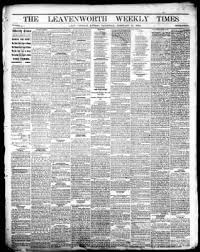Daily Times [Leavenworth, Ks],
October 30, 1861
[From the Baltimore Patriot, Oct. 7.]
We have had an opportunity of conversing with several persons just arrived from the interior of the Southern States, some of whom left rather than take the oath of allegiance to the new Confederacy; and others, because their business was broken up by reason of their still adhering to the old faith and their ancient allegiance.
One of these parties left Richmond, where he had been since February, on Thursday morning last, and spent Friday at Norfolk.–He informed us that there was still a fierce enthusiasm seeming to pervade the secessionists throughout the South, women and children as well as men; that they have a complete confidence in their ability to maintain their position; that there were, to his personal knowledge, many Union men in Richmond, and in Norfolk especially; that the counties of Eastern Virginia, as well as the towns, were swarming with soldiers; that almost every man wore uniform, and was attached to some military organization; that the troops were, in many cases, ragged, and in very few cases uniformed; that they were very badly off for shoes, had very bad blankets, still fewer tents, and were well armed only in certain places, as at Manassas, and in parts of Tennessee, having brought squirrel guns or fowling pieces, with such fixtures as they could provide at home.
He also said that certain medicines were very scarce, and some it was impossible to obtain. Calomel was worth fifty cents an oz., and hardly any to be had at Richmond. Quinine, there was none to be had at any drug store there on Wednesday. Ipecacuanha and iodide of potassium, and opium particularly, were almost unattainable. He found some opium at Norfolk, but neither of the others.
The Tredegar Iron Works were said to be [illegible]ing out one large gun a day. The armories were busy, and as guns were much needed, as fast as they could be manufactured, they were sent to their troops. In Richmond there was not much disorderly behavior on the streets, and no drunkenness, that he saw, among the soldiers. Among the operatives and mechanics especially the Union feeling was strong; but no one could dare to give expression to it. The Union men, however, knew each other, and were objects of suspicion to those who ruled and those who upheld them. The knowledge that a man still adhered to the Union, was sufficient to deprive him of employment, and take away custom from his store. Many Union men who could get away had left, but the great mass, of course, could not get off, and they were waiting, in hope, the arrival of the federal armies to release them from the oppression which was exercised over them.
The Union men would undoubtedly join the United States flag as soon as it could be displayed among them. Thousands would flock to it who now are silenced, and who were actually now forced to bear arms against it.–What was the relative actual strength of the parties there, it was impossible to say. No test could be had–no election held under present circumstances in these States would afford any evidence, even if it were possible to run a Union candidate. None such could show himself, nor would it be safe for any voter to vote for such. The disunionists well know this, as well as the fact that there are thousands of Union men, and their fear of allowing the Union men to find out their own strength causes them to forbid and crush out any attempt at a demonstration.
